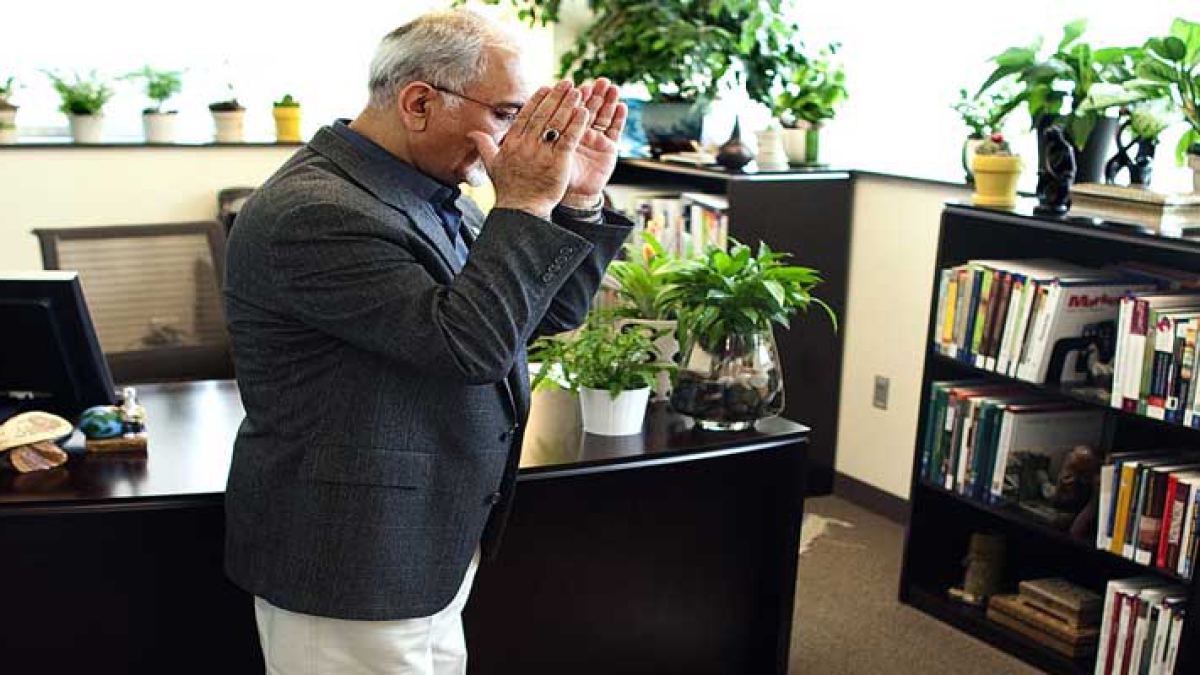Separation of Work and Faith

In our current hyper-productive, "time-is-money" driven society, the concept of a "9 to 5" work day doesn't really exist anymore. The hours spent at work, whether at the office or remotely, often rival the hours spent focused on anything else in our lives. With the ease of technology, work has crept into the corners of our existence and practically obliterated the balance between the public and private dichotomies that were once clearly segregated. Since our work lives and our "other" lives tend to defy separation these days, individuals whose faith is closely entwined with their day-to-day living may find it difficult to navigate through the PC mires of the work world.
Enter Islam.
As Muslims, the belief that Islam is a way of life and not just a religion, throws an even greater wrench into the overwhelming complexity of maintaining personal belief levels and negotiating work situations. From structured prayers and rules of modesty, to a month of fasting and restricted gender relations, God-consciousness exists in all that a practicing Muslim does. So, when work seems to spill over into life and people are discouraged from bringing religion into the workplace, how does a Muslim reconcile the demands of the workplace without compromising his or her faith?
Many articles in the news today show the difficulties sometimes faced by Muslims in the workplace. Abercombie & Fitch is infamous for their violations of the Equal Employment Opportunity Commission (EEOC) terms of discrimination. Many Muslims and other minorities have been wrongfully terminated or not hired because their appearance did not fit the A&F "look" policy. Just this past summer, a situation with a Muslim woman not being hired by the company because of her hijab, echoed a class action suit that was settled in 2009 that challenged the company's right to dismiss a Muslim woman based on her head covering.
Yet, dress-discrimination is not only evident in high fashion workplaces. Even the "happiest place on Earth," Disney World, ran into some discriminatory entanglements when terminating the employment of a woman in the theme park who began wearing hijab. While both work examples are disturbing due to their blatant acts of discrimination, they barely scratch the surface of the issue as compared to the countless other under reported organizational narratives that show the impact of work discrimination targeting those who are "openly" Muslims.
Rather than being viewed as an accessory, the hijab is inherently viewed by the Muslim woman as an extension of her faith. Thus, asking a Muslim woman to remove her head covering for many would be akin to asking her to remove her shirt or her dress. The protection it affords, the faith it represents, and the security of belief that it projects are more than just mere adornments to the woman who covers.
Whether the issue is a knee-long beard, a kufi, hijab, niqab, a burqa, or other appearance-related item at work, one must beg the question, should Muslims put themselves in a work position where they know their faith may be questioned or compromised? Aren't there enough halal opportunities to pursue that would not require a certain "look?" The answer to these questions is shrouded in different viewpoints.
On the one hand, many critics of Islam may argue that a company should not accommodate for one religion over others and that allowing one person to go against a company's dress code would open the door for many other infractions. Still others might argue that as a part of the acculturation process, Muslims must enter precisely these types of "closed door" workplaces and help spread awareness and education in order to eventually overcome the negative stigmas.
While appearance may be the most obvious form of workplace differentiation for Muslims, It is not only women who are confronted with situations of dress or appearance conflict at work. More recently, Whole Foods fired a man for going to Hajj. Another group of Somalis were recently fired from their employment for taking prayer breaks and not recording them. Was this personality to personality conflict or are these both examples of a deeper seated aversion to Islam in the workplace?
The reality is that a lack of education and understanding is what often leads to and exacerbates such conflicts. Imagine for instance that you are living in a country where time is not seen as a fixed entity but rather as a fluid construct. This idea is best conceptualized in Geert Hofsteede's temporal theory of polychronic verses monochronic cultures. Most Muslim cultures tend to be polychronic, which means when someone tells you to meet them at 8pm, but maghrib prayer is at 8pm, it would be expected that the prayer would be conducted first and you may meet the person at 8:30 or even 9:00pm without issue or explanation. This is because the action of the prayer takes priority over the rigidity of the time. In a monochronic culture, as most Western cultures are, time is of the utmost importance and it is seen as disrespectful to be late regardless of the action.
Likewise theories of individualism versus collectivism in how attached a person is to individual pursuits and how someone else may view teamwork, family, and friends can lead into the gray areas of nepotism based on what is expected. High and low context cultures, views on power distance, orientation towards kinesics, haptics (the study of touch) and proxemics (the study of how people use and perceive the physical space around them), high and low uncertainty avoidance and numerous other differences in organizational theory association often leads to workplace misunderstandings.
In the end, whether a Muslim faces workplace conflict due to dress, prayer, time orientation, linguistic variances, nonverbal expectations, or gender interaction, it is still a topic worth addressing if only for the sheer amount of time invested in work throughout one's life. Understanding and education must be nurtured on both ends of spectrum.
*****
Suzy Ismail is the author of "Nine To Five: Muslims in the Western Workplace
Topics: Iman (Faith And Belief)
Views: 7604
Related Suggestions

















